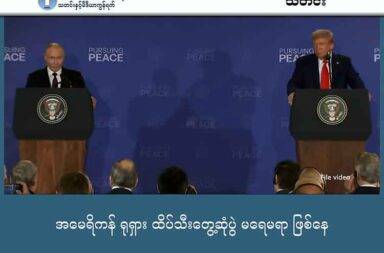Ethnic Parties Reflect on Election Losses
By NETWORK MEDIA GROUP (NMG)
Monday, November 23, 2020
Rumors of false alliances, demographic shifts, and being pitted against the ruling National League for Democracy (NLD) contributed to losses suffered by ethnic political parties in Burma’s general election earlier this month, party leaders told NMG.
NMG spoke to ethnic party representatives in Kachin, Karen and Karenni states, where the National League for Democracy (NLD) won the majority of parliamentary seats.
“Rumors were spread that if ethnic parties won in election, they would work with the USDP and the country would go under the boot of the military again,” Doi Bu, deputy chairperson of the Kachin State People’s Party (KSPP) said, referring to the military-backed Union Solidarity and Development Party.
She said that in areas with a heavy Burmese military influence, the KSPP was accused of having ties to the Kachin Independence Army, and in the Kachin State capital of Myitkyina, people accused the party of being a USDP ally. Doi Bu said the allegations were false, and cost ethnic parties votes.
The KSPP won three seats in the state parliament and one in the Lower House.
“The worst allegation was that since the KSPP was a state-based ethnic political party, we could not form a government. That’s why many people were confused about whether they should cast their ballots for us,” Doi Bu explained.
Sai Sung Lio, the in-charge for the Shan Nationalities League for Democracy’s (SNLD) information department in Kachin State’s Waingmaw Township, said that population shifts influenced the voting results in a way that was not favorable to ethnic parties.
He estimated that 60 percent of the 80,000 voters in Waingmaw participated in the election. Half of these voters were considered “indigenous” people from Waingmaw and half were domestic migrant workers from other parts of Burma. The migrant workers—who are allowed to vote in a constituency if they have lived there for 90 consecutive days—are believed to have largely voted for the NLD.
“It is possible that indigenous people had to work on their rotating farmland and didn’t come to cast their ballots in polling stations on election day,” Sai Sung Lio said of the low voter turnout.
In Sumprabum Township, KSPP vice chair 2 Gungrawng Awng Hkam said that votes from Burmese soldiers based in the area also influenced the electoral outcome.
“Even though we were strong on the ground, migrant workers cast their ballots for the NLD and soldiers cast their ballots for the USDP. That’s why they won in Sumprabum,” he told NMG, adding that the situation was similar in both Waingmaw and Hpakant.
Chair of the Karen National Democratic Party (KNDP) Mann Aung Pyi Soe said that advanced voting turned out more NLD votes than ethnic parties had anticipated, and that voters changed their minds about who to vote for despite promising to support ethnic parties.
“When we went to one village, the village headmen told us they would cast their ballots for us. Actually, we got only five to 10 votes from this village. It’s shameful for us. Almost all of the villagers cast their ballot for the NLD,” he said.
The KNDP did not win any seats in Karen State, but the NLD won 30, the USDP won four, and the Karen People’s Party won one. The Mon Unity Party (MUP) won the Mon ethnic affairs ministerial post.
In neighboring Karenni (Kayah) State, the NLD won 20 out of 34 seats, with the Kayah State Democratic Party (KySDP) winning eight seats and the USDP winning six seats.
“Our rival party was the current ruling party. The government provided assistance to people during COVID-19 period. Many people saw this assistance. Therefore, they cast their ballots for the ruling party,” KySDP chair Khu Thae Reh told NMG, adding, “another reason is that many people think that only the NLD party can compete with the army.”
A total of 91 political parties ran for election across the country but only 19 political parties won parliamentary representation.
According to the Union Election Commission, the NLD won 920 seats, the USDP won 71 seats, the SNLD won 42 seats, the Arakan National Party won 15 seats, the Ta’ang National Party won 12 seats, the MUP won 12 seats, the Pa-O National Organization won 11 seats, the KySDP won 8 seats and the KSPP won four seats in Burma’s 2020 general election.
In addition, Arakan Front Party and Wa National Party won three seats each, the Lahu National Development Party, Zomi Congress for Democracy, Lisu National Development Party, and teh New Democracy Party (Kachin) won two seats each. The Kayan National Party, Karen People’s Party, Shan Nationalities Democratic Party and Chin National League for Democracy won one seat each. Two independent candidates won seats each, and another two won ethnic affairs ministerial posts.


